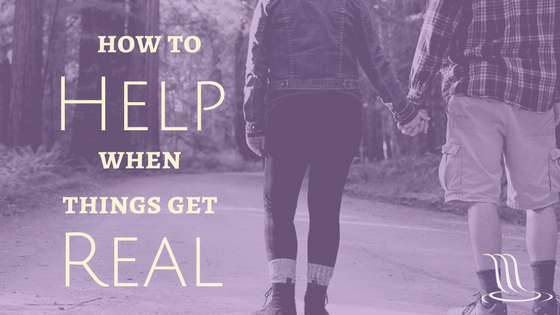
There’s been much made in the news about terrible things happening around the world, and rightly so. Families are displaced by wars, genocide goes unchecked in Asia and the middle east, and natural disasters cripple entire societies. When disasters like this strike, aid is organized, charities and religious groups scramble to the rescue.
But what about the smaller tragedies, those disasters that feel enormous and earth-shaking only to that one person or that handful of people you’re close to? The loss of a spouse through death or divorce, incarceration, separation from children, death of a loved one, violent crime, or even the loss of health or employment? Mental health problems can be simultaneously shaming and debilitating, with stigma driving the sufferers and their loved ones deeper into isolation.
When these things happen to someone you know, it’s hard to know what to do or what to say. The best most of us can do is politely offer help (knowing they won’t want to impose by actually asking us for anything), try to “be there” for them (whatever that means). We wish we could do more. We mean well. But we feel paralyzed by fear of doing the wrong thing, of maybe making things worse.
You can do something. It won’t change their life or make everything okay, but it also won’t be impossible for you to do, an they really will feel their burden being lightened, even if only a little. What follows are some suggestions to consider when someone you know has been through something traumatic or devastating.
All of these suggestions are just that, and you should use your own judgement to tailor these ideas to the circumstances.
Dancing hotdog
Give Hallmark the day off. Nobody really buys the schmalzy messages in overpriced gift-cards, anyway. But you’d be surprised what good a little laughter can do.
Send them something funny, something that might draw out a smile–a dancing hotdog GIF, a link to a cat video. But whatever you send, make it personal and private. Use a text message, Instagram, Facebook, whichever platform you prefer. Send one every day, or at least a few times a week. It lets them know you’re thinking about them without getting all sappy about it, and without drawing any possibly unwanted attention to their misfortune.
Logistics
Treat them to some food. Sure, it’s cliché to bring a casserole to the doorstep. But clichés are clichés for a reason. Someone who’s going through something terrible may struggle to do the basics. Modulate your strategy to suit how close you are to the person, but it might be greatly appreciated if you can help with the small stuff.
Have a load of groceries or toiletries delivered to their home.
An Uber gift card, or a parking garage membership can make all the difference, especially when someone is facing frequent hospital trips or have some other crisis that’s making transportation more complicated for them. Even if all you got them was a small pre-paid gas card, the gesture could make a big difference.
It’s easier than ever to send care packages to cover the little necessities of life. It’s both a thoughtful gesture that lets the person know they’re not alone while also relieving some of their troubles.
Shut up
Try to resist the urge to offer advice or be the shoulder to cry on, be someone to vent/rage to, be the one to offer advice. Numbness is a defense strategy that shouldn’t be trifled with, and might result in the person pushing you away–possibly even violently.
Besides, this isn’t about you and your role, or how you see yourself. Make it about them and what they need. Make yourself available and be ready to respond to their needs without needing to be asked, and without drawing attention to the generosity of your offer. Just be present and responsive to what they need.
Be present in every sense and just listen to them. It’s amazing what people say when you just sit quietly and let them express whatever they need to say at their own pace. This is harder than it sounds, so bring some imaginary duct tape to put over your mouth.
Thoughts and Prayers
Now this one kind of is about you. Pray about them. Think about them. You can tell them you’re sending them thoughts and prayers if you want to, but don’t just say it. It’s better to do it and not say it, than to say it and not do it.
Pondering their difficult situation will increase your compassion for them in a deep and genuine way. You’ll be more emotionally responsive to their needs. Side benefit: exercising your compassion in this way could even make you a better person long-term.
Life is hard, as you’ve probably figured out by now. No matter how immaculate our own choices may be, bad things will happen, even to you. If you’re paying attention to the needs of those you love, and are attentive, that builds you crucial social capital–a social savings account of sorts. You’ll build your network of emergency responders of your own, and make you better prepared to survive the encounter when death knocks on your door.
Choose the good life.
Tom Gunn is the blog editor and marketing director for The Good Life Massage. You can hire him to help build your brand and reach your customers by emailing him at tomgunn@gmail.com.

